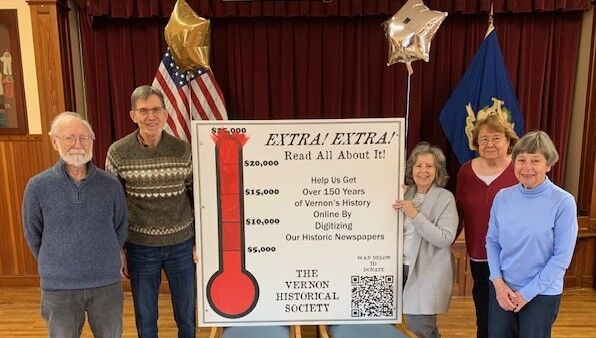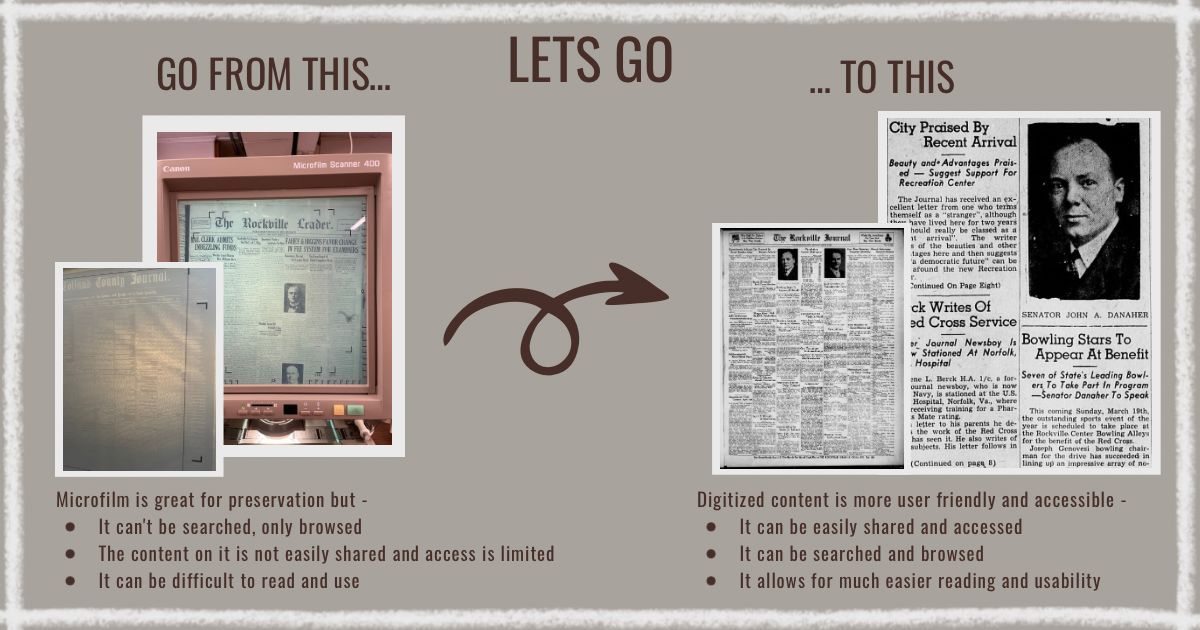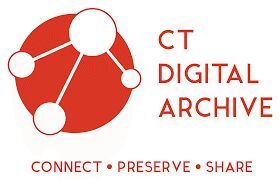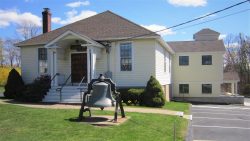
Fund Raising Update: Digitization Funding Goal Achieved!
We recently achieved our goal of raising funds necessary to have microfilmed copies our of local historic newspapers digitized! Financial support came from local residents, former residents and out-town donors. The Digitization Project received a grant of $2000 from the Donna Fund of the New England Society of Professional Genealogists. A generous donation of $10,000 from the Rockville Bank Community Foundation allowed the Society to end the campaign with a bang!
Members of the Digitization Committee gather to celebrate reaching our campaign goal.
From left to right, Jon Roe, Donald Rogers, Jean Luddy, Betty Badstuebner and Barbara Muldoon. Committee members Greg Gunn and Kate Sheely were unable to attend.
We appreciate everyone’s support in this community effort. The digitization of the microfilm will be completed. After the files are successfully uploaded to CTDA, our local newspapers will be available online. Imagine what lost stories will be rediscovered!
Many Thanks to all who donated to our project.
Newspapers provide readers and researchers with incredible information on events, people, places, attitudes and opinions from the far to the recent past. The Society houses hard copies of local papers from the 19th and 20th centuries, but they are in fragile condition. Starting forty years ago the papers were filmed and microfilm copies were created. This microfilm is owned by and housed at the Rockville Public Library, where it is accessible for use only via a microfilm reader. As we move into the digital age, VHS, in cooperation with the Rockville Public Library, is scanning the microfilm to digital files that will be made available free to everyone anytime from an online hosting source. Researchers, genealogists and students of the past will appreciate access to this rich archive.
Local papers selected for digitization:
Tolland County Journal: 1867-1884
Rockville Journal: 1885-1899 and 1911-1968
Rockville Leader: 1902, 1908, 1910, 1919-1964
Tri-Town Reporter: 1973-1984
VHS has employed professional archivist Nicole Besseghir as project manager to help guide us through the digitization process and facilitate work on the project. She has extensive experience in both historic newspaper digitization and working with local history collections. Nicole is managing the project on VHS’s behalf, which includes advising the VHS director and newspaper committee on project steps and decisions, project planning, coordinating and communicating with vendors, preparing materials for digitization, working on quality review of the digital files and preparing them for upload to the database.

Benefits of Newspaper Digitization
- The Tolland County area is underrepresented in the digitized newspapers that are currently available online. This project will bring more than 100 years of Tolland County newspapers and history online for the first time.
- Making historic newspapers available digitally vastly expands their accessibility, usability, and findability especially with functions to search for names of people and events over periods of time.
- Digitizing and viewing the newspapers on the computers also makes them easier to read than on microfilm and in print, since the computer allows users to zoom to better view the content. They can also save and print the articles.
- A wider range of audiences will be able to access and utilize the historic newspapers once they are digitized and online.
- The ability for the newspapers to be used in classrooms and in schoolwork will allow educators to incorporate them into their teaching and classroom activities.
- Now other cultural heritage institutions will be able to make use of the papers for their own work.
 Our Hosting Site
Our Hosting Site
Once digitized and reviewed, the newspapers will be loaded into an online database, the Connecticut Digital Archive (CDTA), where they can be viewed and searched by anyone. They can be found by utilizing an internet search engine and by directly visiting the database.
CTDA is operated and maintained by the University of Connecticut as part of their Digital Preservation Repository Program. The database was created over a decade ago and the CTDA team continues to improve and meticulously manage the database and serve its members.
Visit the Connecticut Digital Archive
If we are fortunate to receive donations in excess of the needed amount, we will establish a designated account to complete the digitization of other documents from our collection.
Many thanks for helping us to bring our local history into the 21st century!
